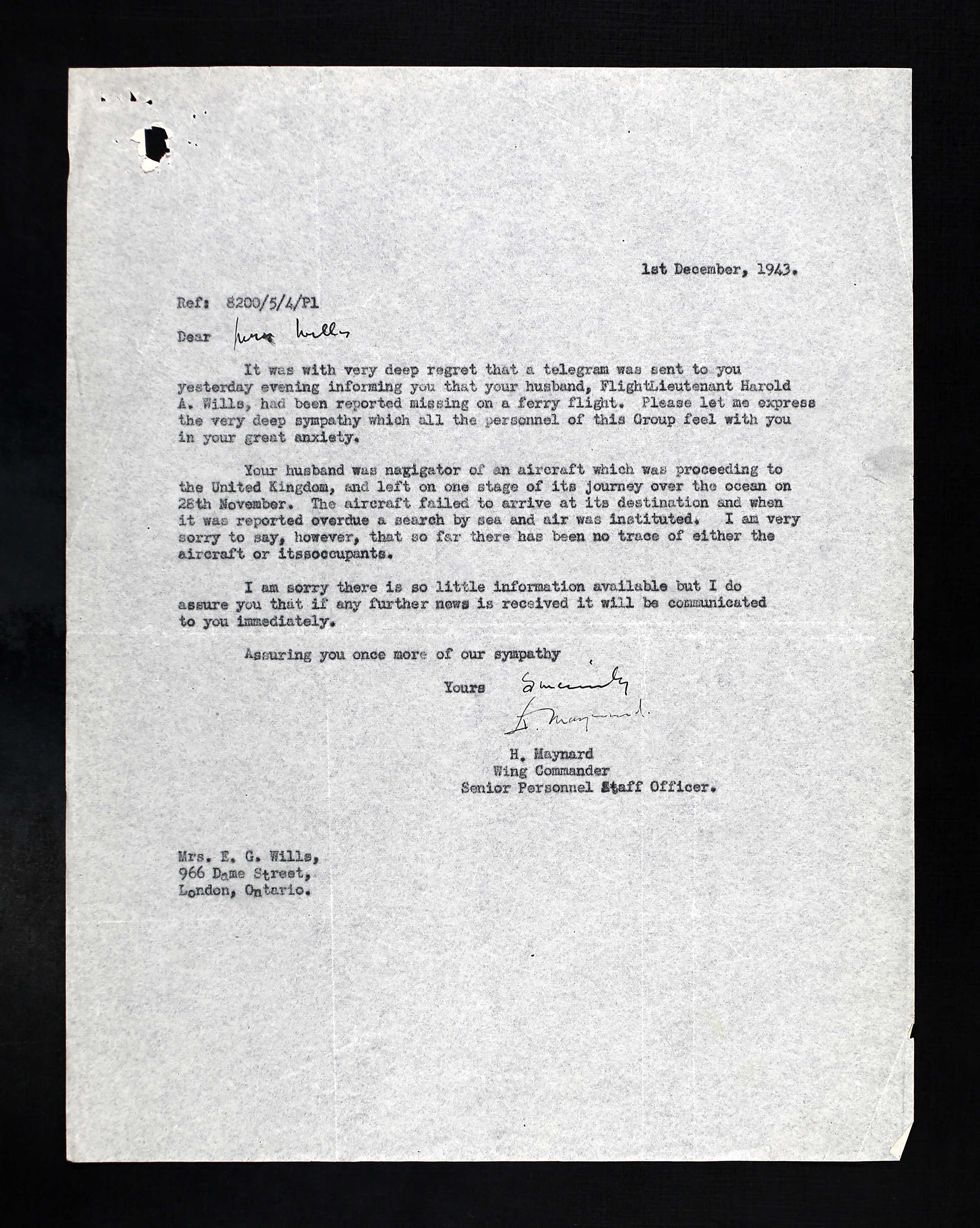
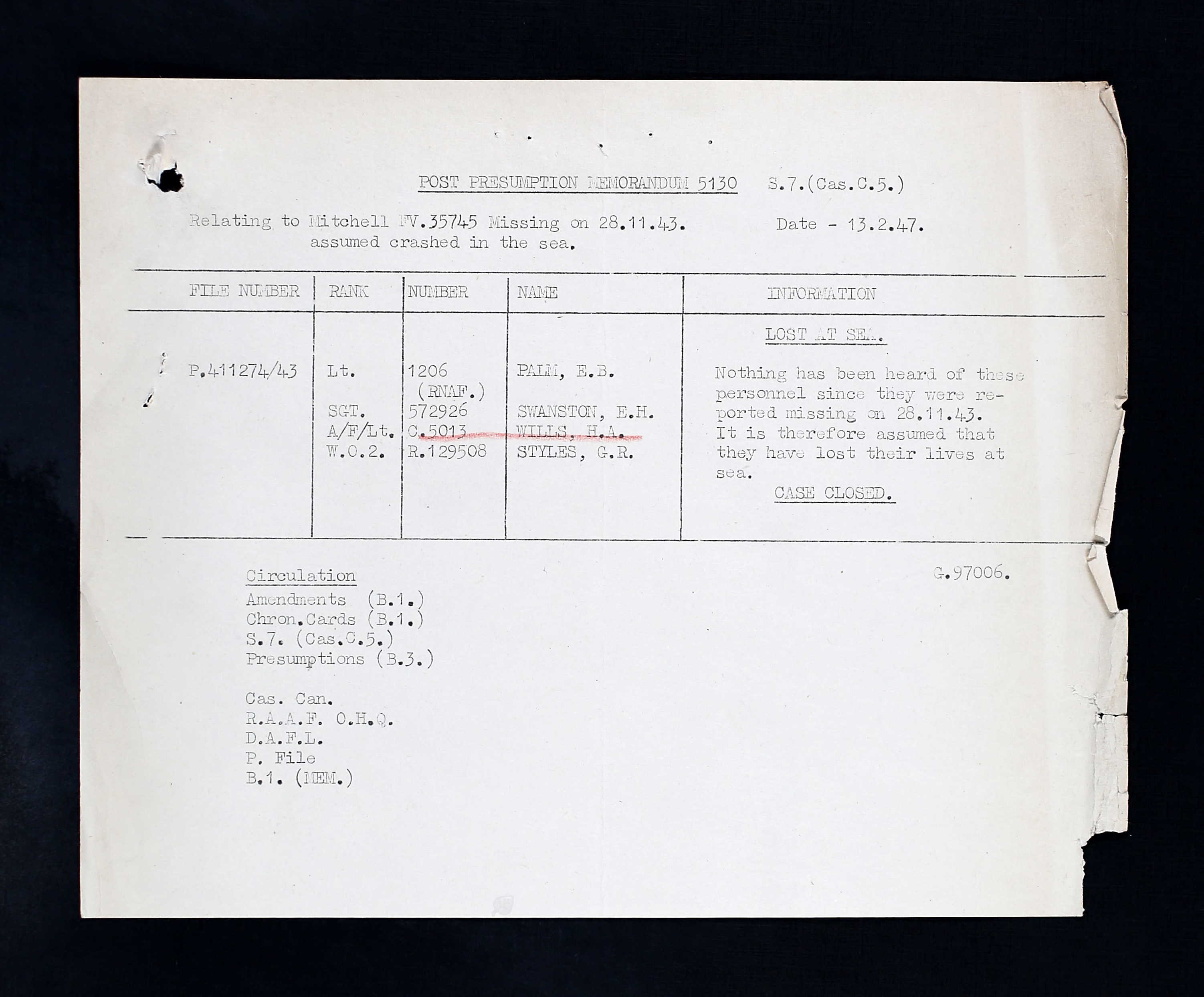
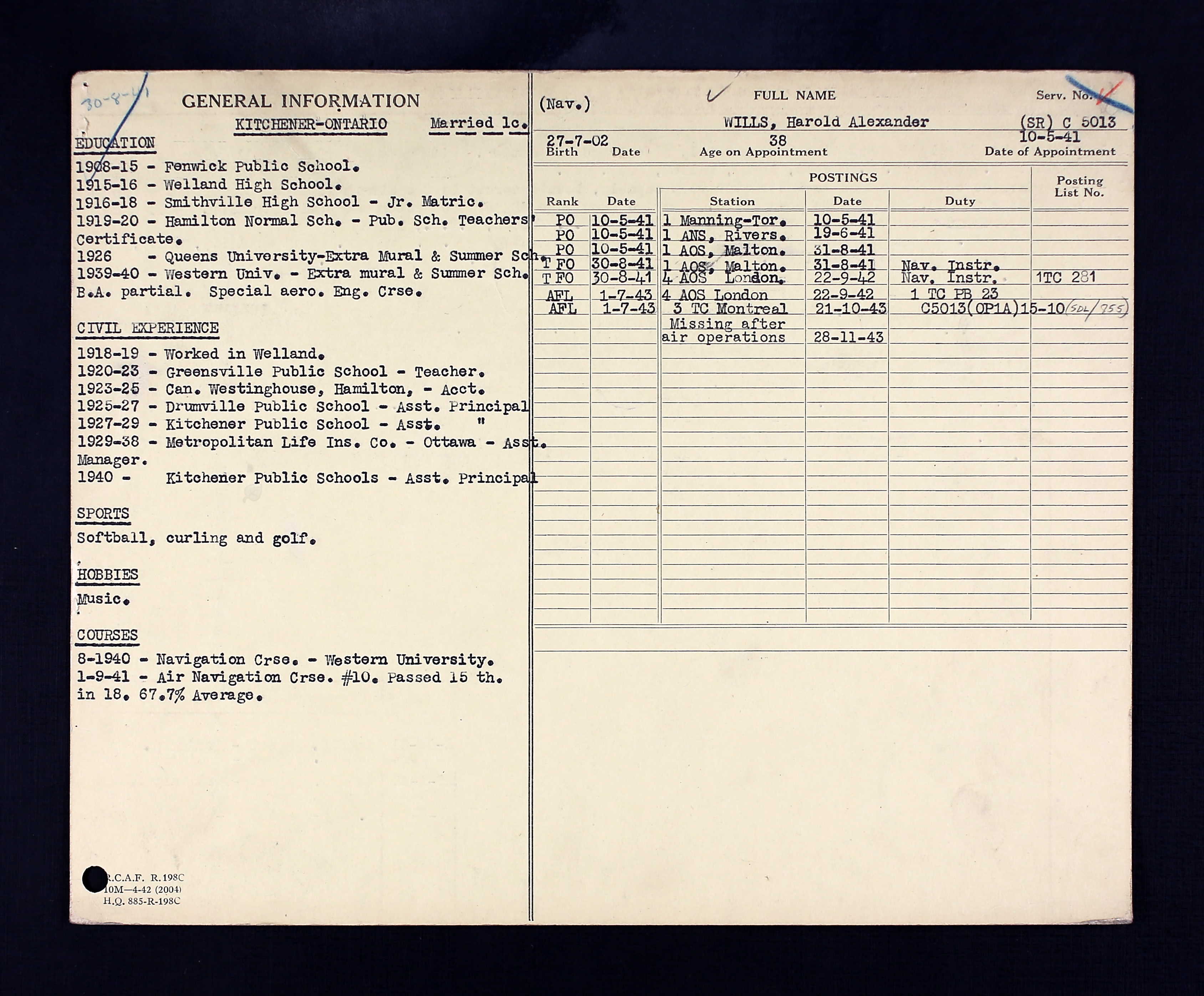
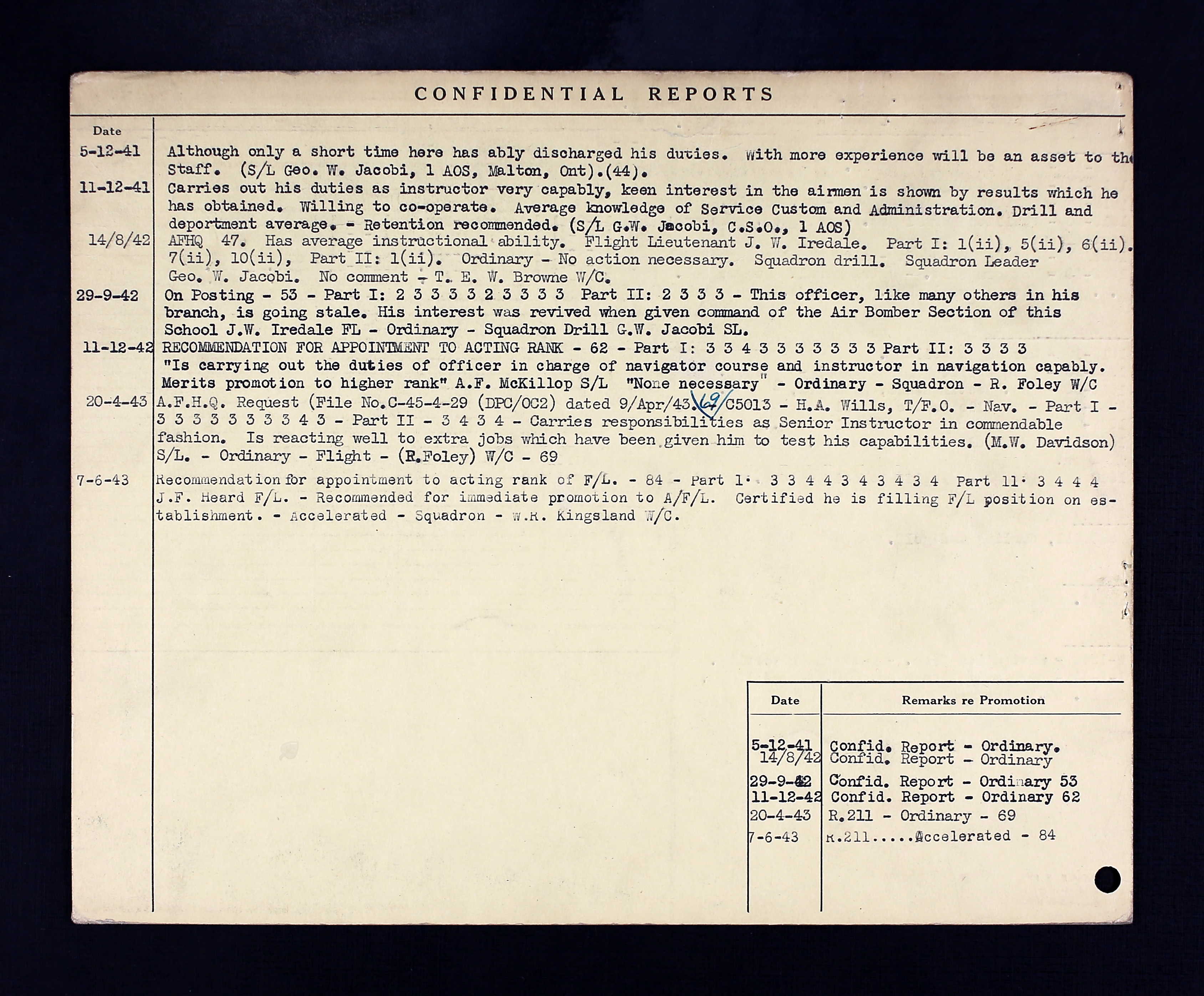
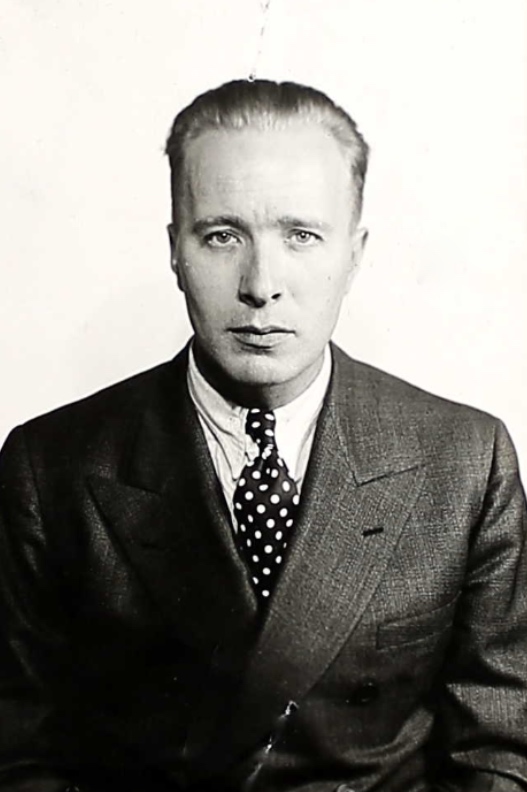
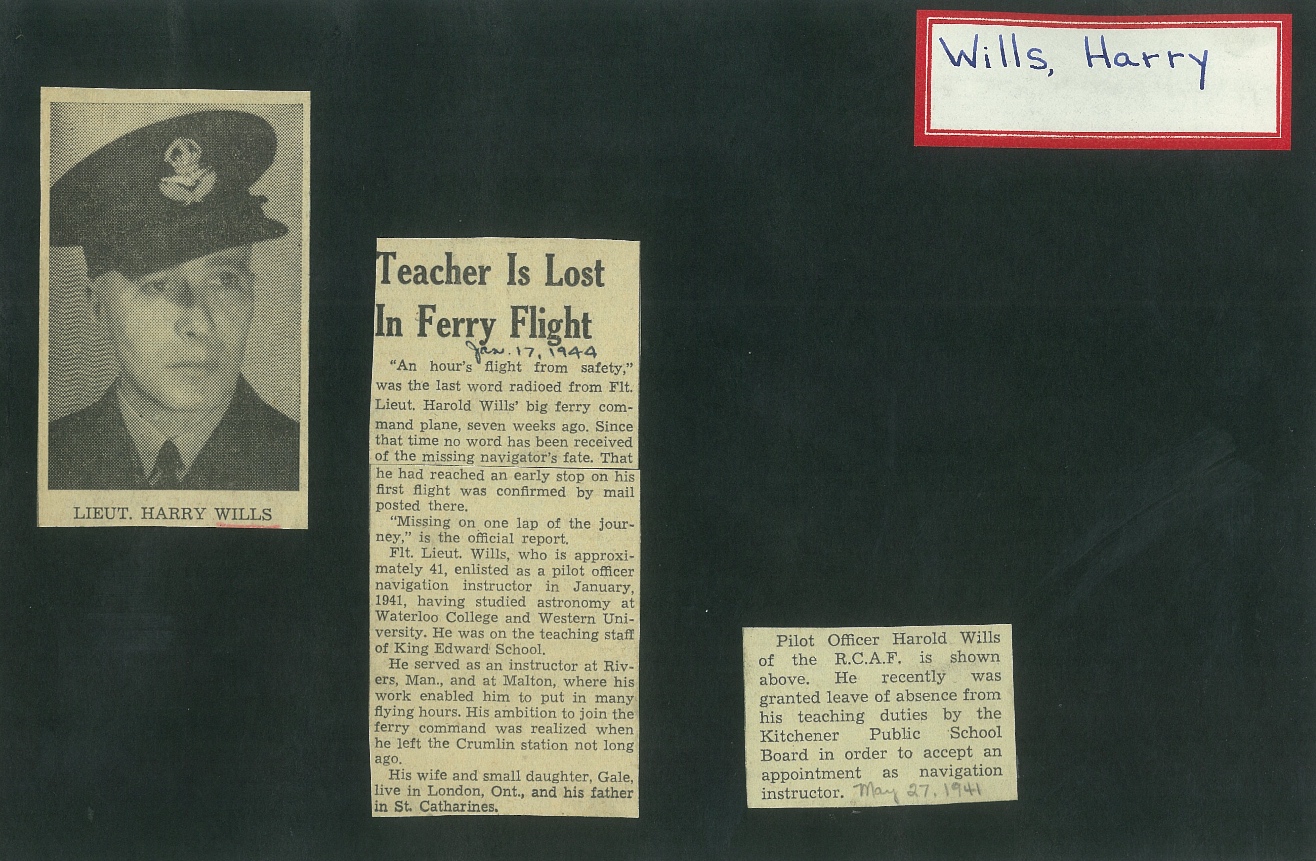

July 27, 1902 - November 28, 1943







Harold ‘Harry’ Alexander Wills born in Pelham Township, Welland County, Ontario, was the only child of Harvey Wesley Wills (1879-1954), nurseryman, and Elizabeth (nee Greenwood) Wills (1880-1940). The family was Presbyterian.
Harry married Edythe ‘Gladys’ Gale (1901-1985) in Hamilton, Ontario on July 18, 1925. They had one daughter, Jacquelyn ‘Gale’ Wills, born on November 4, 1935 in Toronto. She and her mother resided in Kitchener by late 1944. Harry held 1x$5 War Savings Certificate and had a $5,000 life insurance policy. Gladys never remarried.
Harry attended University of Western Ontario for three years and was a teacher and administrator for the Kitchener Public School Board for ten years prior to his applying with the RCAF in Toronto on September 21, 1940. After the war, he hoped to remain in the permanent Air Force or complete university courses. On his Interview Sheet, he was 38 years old, stood 5’9” tall and weighed 175 pounds. “Queen’s and Western Universities one half of Bachelor of Arts course completed. Eleven years’ experience in commercial offices. Nine years as public-school teacher. Took special air-navigation and spherical trigonometry and astronomy at Western University. Sports: Golf, curling, softball, skating, swimming, and volleyball. Hobbies: music, piano playing and singing. Clean cut. Alert. Well-mannered. Nice personality. Good physique. Consider above average in intelligence. Is not within preferable age as navigation instructor by has just finished the courses essential in this branch. Believe his services will be useful.” Harry was recommended as a Navigation Instructor. “Flat feet, congenital, no symptoms. Left inguinal hernia.” Harry had light brown hair and grey eyes.
On May 2, 1940, Harry wrote to the Department of Defense, Air Branch, in Ottawa offering his services for the duration of the war and for as long that was necessary. He felt that with his teaching experience, he would be an asset in the training departments of the RCAF. “I have been rejected for a very minor disability by our local unit, but I feel I can be of service, since the disability in no way affects my usefulness and I am anxious to do my part.” He was going to take a course in elementary Air Navigation at UW in London, July 8 – August 16, 1941.
On March 8, 1941, Harry wrote a letter to G/C A. de Niverville in Ottawa explaining that although he would prefer to be a navigator, he was willing “to go in any department.” He had hoped to hear something back from the RCAF about when he could take the next Navigation Instructors’ Class, “rather anxiously watching the mails. I am eager to do my bit, and am taking this means to ask for a review of my application, in the hope that I may receive a notice to report in the very near future.” On Marcy 15, 1941, he wrote another letter. “I am very keen to enter to Air Force, so keen in fact, I have had a hernia operation in order to qualify, medically, and because of my eagerness to get in, I have been wondering if I might be better fitted for some other branch of the service. I understand I was recommended for Air Navigation, but I also believe this field is rather limited as to the numbers of instructors required. (I also took a course in Navigation and allied subjects last summer, at my own expense.) I am especially good at mathematics, have had several years teaching experience and am 38 years old. Before going to Normal School, I obtained considerable mechanical experience as machine repair man in a Welland, Ontario, factory. I am rather mechanically inclined and have the ordinary experience with fire-armsof an ardent hunter. Because of these facts, I have been wondering if I might be better fitted to become an instructor in Armament work….I would also like to know the possibility of being called up within a very few weeks, because if this is impossible, I will offer my services to the Engineers. I understand, they also need mathematicians.”
On March 22, 1941, Harry received a reply telling him that his application has been considered. “Present indications are that there will not be a further intake of personnel to undergo a course at the Armament or the Air Navigation Schools prior to June next….if you accept another appointment, please notify these Headquarters so that your application may be withdrawn.” G/C A. de Niverville.
Another letter, written on April 21, 1941 by Harry: “I am taking the liberty of sending a copy of the Air Navigation examination I successfully passed last August. …I am also enclosing a copu of a Spherical Trigonometry examination I passed at the same time. In fact, I led the class, obtaining 93%. I trust this will clarify any doubts you may have as to my qualifications and lead to my receiving SOON, an order to report for service in any department whatever.”
June 5, 1941: “P/O Wills has completed training as required in musketry and revolver,” No. 1 Manning Depot, Toronto, Officers’ Courses.
June 23 - September 1, 1941: Air Navigation Course #10. Passed 15th out of 18 with 67.7%. December 5, 1941: No. 1 AOS, Malton, Ontario: Although only a short time here has ably discharged his duties. With more experience, will be an asset to the Staff.”
A confidential report ‘End of Six Months Probationary Period’ for F/O H. A. Wills dated December 11, 1941 showed that Harry completed a course in Air Navigation at Rivers, Manitoba and was posted to NO. 1 AOS on completion of the course 31-8-41. His attitude: “This officer carries out his duties as an instructor very capably and his keen interest in the airmen is show by results which to date, he has obtained. He is all times willing to cooperate. He has average knowledge of both Service Custom and Administration. As an officer, his drill and deportment is average.” S/L Geo. W. Jacobi, No. 1 AOS, Malton, Ontario
August 14, 1942: “Has average instructional ability.” September 29, 1942: “This Officer, like many other in his branch is going stale. His interest was revived when given command of the Air Bomber Section of this School.” December 11, 1942: “Is carrying out the duties of officer in charge of navigator course and instructor in navigation capably. Merits promotion to higher rank.” On March 1, 1943, Harry was awarded his Navigator’s Badge. April 20, 1943: “Carries out responsibilities as Senior Instructor in commendable fashion. Is reacting well to extra jobs which have been given h to test his capability.” At No. 4 AOS, London, Ontario, June 7, 1943: “Recommended for immediate promotion to A/F/L. Certified he is filling F/L position on establishment.”
On October 21, 1943, Harry was taken on strength with No. 3 Transport Command based in Montreal. November 11, 1943: “Above average on plotting tests, working of sights, and compiling of flight plans. Has shown keenness and interest during the Course. Ability above average.” RAF Training Report, RAF Ferry Command.
On November 28, 1943, Harry was aboard Mitchell FV900 on a ferry flight between Greenland and Iceland along with Gerald Raymond Styles, J41925 and two others. Much information about both Canadian men. Their experiences can be found in Carl Christie’s book Ocean Bridge, The History of RAF Ferry Command, published in 1995 but the University of Toronto Press.
Harry was a prolific letter writer, as seen in his correspondence with the RCAF; he also kept a diary. He wrote two or three letters each week to his wife and daughter during the war. In the book OCEAN BRIDGE, Carl Christie uses the letters and diary entries to illustrate what an aircrew experienced on Ferry Command, pages 183 – 194. For example, “The type of ship & weather determines the route you take. I’ll take the Iceland trip if possible. It is broken up over 3 days and the hops are fairly short.” Harry also explained high altitude flying, having to go into a decompression changer at McGill University. He explained the many delays flying from point to point. He promised his daughter that he would be home for Christmas.
CREW: Lt. Erik Bertil Palm, 1206 (Royal Norwegian Air Force), Sgt. Eric Hanway Swanston, 572926, (RAF) A/F/Lt H. A. Wills, C5013, (RCAF) and WO2 G. R. Styles, R129508, (RCAF). “Lost at sea. Nothing has been heard of these personnel since they were reported missing on 28.11.43. It is therefore assumed that they have lost their lives at sea. CASE CLOSED.” The last that was heard from the aircraft was about an hour out from Reykjavik: a radio signal sent by Gerald Styles.
Gladys, residing in London, Ontario, received a letter, dated December 1, 1943 from W/C H. Maynard, Senior Personnel Staff Officer. “It was with very deep regret that a telegram was sent to you yesterday evening informing you that your husband, Flight Lieutenant Harold A. Wills. Had been reported missing on a ferry flight. Please let me express the very deep sympathy which all the personnel of this group feel with you in your great anxiety. Your husband was navigator of an aircraft which was proceeding to the United Kingdom and left on one stage of its journey over the ocean on 28th November. The aircraft failed to arrive at its destination and when it was reported overdue, a search by sea and air was instituted. I am very sorry to say, however, that so far there has been no trace of either the aircraft or its occupants. I am sorry there is so little information available, but I do assure you that if any further news is received, it will be communicated to you immediately. Assuring you once more of our sympathy.”